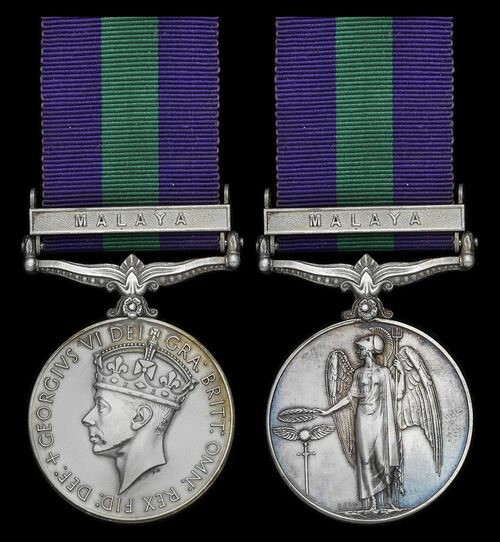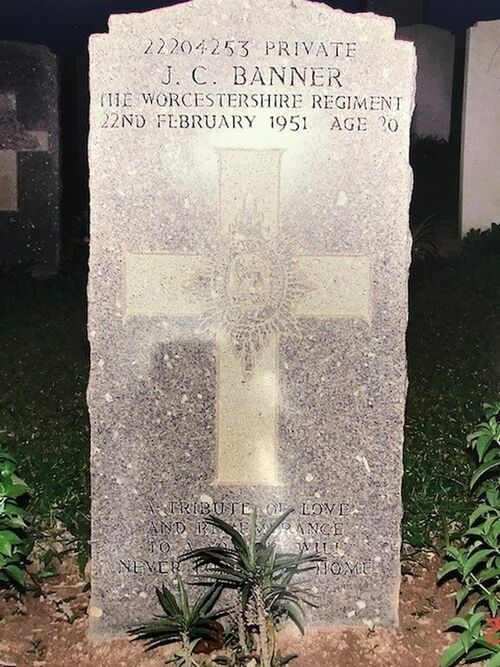Auction: 24002 - Orders, Decorations and Medals
Lot: 168
A scarce General Service Medal awarded to Private J. Banner, Worcestershire Regiment, who was killed in action on 22 February 1951 at the Melville Estate, near Labis, Segamat, Malaya
General Service 1918-62, 1 clasp, Malaya (22204253 Pte J. Banner. Worc. R.), good very fine
Joseph Charles Banner was born circa 1930 in Leek, Staffordshire the son of Mr. E. Banner. He was one of five sons and three daughters and initially went to school in Leek and later in Brown Edge, Staffordshire. On leaving school, he found employment on local farms and then became a miner at a local colliery. He also became a member of the Brown Edge Youth Club before becoming a regular soldier in the Worcestershire Regiment.
He had not served with the colours for long, when the Malaya Emergency erupted and the British Government decided to send in troops to protect their interests and assist the Federation of Malaya forces to defeat the insurrection of the Malayan Races Liberation Army, formerly the Malayan Communist Party, which had taken to arms in 1948 to regain control of the country. Aligned to the M.R.L.A. were the Min Yuen - a well organised and armed group who lived within local communities and reported all troop movements to their armed wing and the M.R.L.A. who then sought to frustrate any attempt the authorities made to curtail their activities.
On 24 May 1950, the 1st Battalion, The Worcestershire Regiment sailed from Liverpool aboard the H.T. Empire Pride to fight what was to be a guerrilla war in jungle conditions. They had made their final preparations for embarkation at The Dale, Chester.
After sailing to Port Said, passing through the Suez Canal, passing Aden and Ceylon, Singapore Harbour was reached in the early morning of 18 June. The Battalion moved to a training and transit camp at Nee Soon, arriving at about midday and experiencing the humid heat for the first time. Here and nearby, they undertook their jungle training and acclimatised to their new surroundings.
On 29 September, the Battalion concentrated at Sungei Patani and moved to the town of Segamat in northern Johore - an area rich in rubber plantations and dense jungle and one that had seen considerable communist activity.
In this area, the police were to concentrate on the populated areas and rubber plantations and the army, the jungle. The intention was to ambush the terrorists on their lines of communication. In mid February 1951, 'A' Company moved from Segamat to Labis - amongst the men was Private Banner. On 22 February, some terrorists burnt a lumber lorry on the Melville Estate, a few miles west of Labis and the driver reported the incident to the local police post, who asked 'A' Company to investigate.
A police inspector and the driver were escorted to the scene by ten soldiers of 'A' Company under the charge of an Officer. On reaching Melville Estate, the driver explained that his lorry was a little way inside the jungle down a logging track. As a precaution and to test the driver's loyalty, he was made to head the column. Suddenly, the patrol came under extremely heavy automatic fire, wounding the driver, the inspector and four soldiers. Fire had come in from a length of about 400 yards along one side of the track and also from the head of the ambush on both sides, firing straight down the line of the track. It was heavy and sustained. On the other side of the track lay jungle and waist high swamp.
Parties of terrorists moved around the flanks of the ambush, encircling the patrol. At the same time, the remaining five soldiers (one other was now missing), tried to out flank the terrorists not realising the size of the unit they were confronting and waded through the swamp parallel to the track for about 150 yards. Re-emerging on the track, they realised that they were still within the killing zone of the ambush and attracted more heavy fire. Knowing that the situation was desperate, they decided to make a dash for it and moved towards the only section of jungle from which there was no firing - a small gap to the north-east of their position. Slowly, the firing lessened and after two hours the survivors reached Melville Estate. Immediately, a large police and army force went to the scene of the action and found four soldiers dead and one seriously wounded - he later died that night.
It transpired that the terrorist force that attacked the small patrol numbered about 85 strong. One of the wounded soldiers, Private Harvey, who had been hit in the opening bursts of fire, had been immediately attended to by Sergeant A. Rowley, who was hit and killed whilst selflessly treating and caring for his wounded comrade - he was posthumously 'mentioned'.
Those who died were:
Sgt. A. Rowley of Worcester
Private J. Banner of Stoke-on-Trent
Private R. Harvey of Wednesbury
Private G. Plant and Private D. Walker, both of Macclesfield.
One terrorist was also killed in the exchange of fire. Banner was buried in Plot 1, Row C, Grave 15, Kranji Military Cemetery, Singapore. He was one of only 11 soldiers of the Worcestershire Regiment who were killed in action during the Malaya campaign.
In total, 50 terrorists were killed by soldiers of the Worcestershire Regiment during the campaign and two were captured.
His father received notification of his son's death from the War Office at their home at Fold Villa, Woodhouse Lane, Brown Edge, Staffordshire. His Medal was sent to his next of kin on 12 March 1955, some four years after his death. On 10 December, 2015, the Vendor visited Singapore and attended the Kranji Military Cemetery, taking his richly-deserved Medal to his grave.
Subject to 20% VAT on Buyer’s Premium. For more information please view Terms and Conditions for Buyers.
Sold for
£900
Starting price
£520







